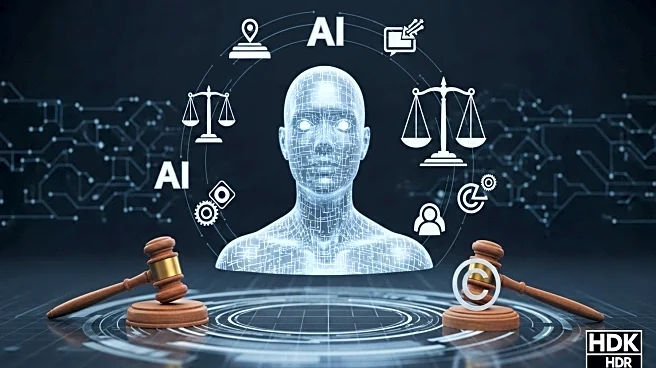What is the story about?
What's Happening?
OpenAI has launched its updated video generation model, Sora 2, which uses copyrighted characters like Pikachu, Goku, and SpongeBob SquarePants. The model trains on licensed art by default, requiring copyright holders to opt out actively. This approach has led to AI-generated videos featuring well-known characters, raising concerns about copyright infringement. Companies like Nickelodeon and Nintendo may need to request OpenAI to stop using their characters, as the model can generate videos of almost any copyrighted material. The situation mirrors ongoing legal battles involving other generative AI companies, such as Midjourney, which faces lawsuits from major studios for similar practices.
Why It's Important?
The use of copyrighted characters by AI models like Sora 2 poses significant legal and ethical challenges for the creative industry. It highlights the tension between technological advancement and intellectual property rights, potentially leading to widespread legal disputes. This development could impact how companies approach AI technology, influencing policy and regulatory frameworks. Artists and animators express concern over the potential for AI to replace human creativity, affecting job security and the value of original art. The situation underscores the need for clear guidelines on AI's use of copyrighted material to protect creators' rights.
What's Next?
Legal actions from affected companies are likely, as they seek to protect their intellectual property from unauthorized use by AI models. The outcome of these cases could set precedents for how generative AI interacts with copyrighted content, influencing future technology development and usage. OpenAI may need to revise its model training practices to comply with legal standards, potentially affecting its business operations. The broader industry may see increased advocacy for stronger copyright protections and ethical AI practices, shaping the future of AI in creative fields.
Beyond the Headlines
The controversy surrounding Sora 2 raises broader questions about the ethical use of AI in creative industries. It challenges the notion of creativity and originality, as AI-generated content blurs the lines between human and machine-made art. The situation may prompt discussions on the cultural impact of AI, exploring how technology influences artistic expression and societal values. Long-term, this could lead to a reevaluation of the role of AI in art, balancing innovation with respect for intellectual property and human creativity.















